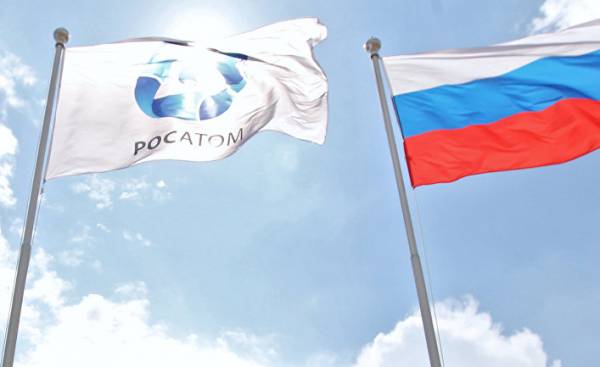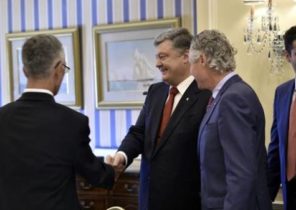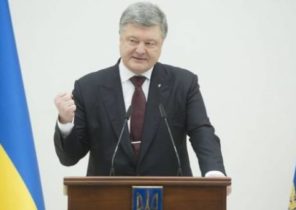
Poland is among the countries that do not use nuclear energy to meet its energy needs, and in Russian-Polish relations the focus is mainly on issues related to gas and its transit, says the employee portal Biznes Alert Roma Bojanovic.
However, long known that Moscow thinks their actions for the long term and takes into account multiple areas related to energy. Therefore, in Paris, Kiev and Minsk has “Rosatom”. Take a close look at Russia’s actions carefully, we can say that she tries to put European nuclear energy dependent on a single source of supply of fuel to reactors and technologies that are required for their safe operation. This is reminiscent of the situation with gas.
Corporation “Rosatom” is associated primarily with the maintenance of nuclear power plants and electricity production, but this is just one of the activities of the company. The Corporation is also engaged in uranium production, its enrichment and processing into fuel for reactors; the design, construction and oversight of the operation of modern nuclear power plants. Rosatom is the recycling of spent nuclear fuel and radioactive waste; creation of nuclear reactors for submarines and most powerful icebreakers serving the Northern sea route; the production of isotopes for nuclear medicine (including iodine-131 and technetium-99). Rosatom is also investing in future technologies: heavy-duty, extremely elastic, wear-resistant and possess chemical and corrosion resistance of composite materials. The world, particularly the developed West, soon will not be able to do without them.
The expansion to the West of Europe
Rosatom has opened a new Chapter in its history: in October 2014, he established a regional center in Western Europe with headquarters in Paris, which became part of the European network. The objective of the regional centers “Rosatom” is, on the one hand, new contracts, and with another — in the maximum rapprochement with clients, learning about their current needs and forecasting future. According to Deputy Director General Kirill Komarov, the opening of the new centre was “a logical step in the development of cooperation with French and European partners that began one year ago. Russian uranium and its isotopes has come first in France and then appeared in the European and global market.”
One of the largest joint Russian-French projects was the production of uranium metal from which will be made for nuclear fuel under construction in the South of France research reactor “Jules Horowitz”. This research center will be engaged in the study of the characteristics of nuclear fuel used in operating the reactors, testing of fuel for new reactors and radioisotope production for medical needs.
On 19 June, held in Moscow International forum “ATOMEXPO-2017”, the state Corporation “Rosatom” and the French company AREVA NP signed a Memorandum of understanding relating to the fuel production, process automation and manufacturing equipment for nuclear power plants.
Belarus: the atom instead of gas or any other form of dependence
One of the most acclaimed investments in our region, which is a subsidiary of Rosatom nuclear power plant in Belarus Astravets, the construction of which became a part of the program on overcoming of Belarus depends on Russian gas. Its launch will allow to reduce gas consumption by 5 billion cubic meters per year. The contract, signed in October 2011, includes the construction of two units on the project “NPP – 2006” with the reactor plant V-491.
The choice of location for the construction of the power plant with a rather outdated design has drawn sharp criticism from Lithuania. Nuclear power plant is located just 23 kilometers from the Lithuanian border and 55 kilometers from Vilnius. In 2016 there have been two incidents that may adversely affect the operation of reactors in the future. In April, under its own weight collapsed the housing design of the nuclear maintenance. Experts say that the plant is being built in a hurry: builders constantly customize the President Alexander Lukashenko. Then when you test the installation with a height of 2-4 meters broke the 330-ton reactor. Of course, Minsk has called both incidents minor accidents. “Rosatom”, which deals not only with the construction of the power plant, but the financing of this investment, has offered to donate a new instance of the reactor to replace the broken one, and the first to install the reactor, destined for the second unit.
Concerns nearest neighbors
Lithuania, in the vicinity of which is a newly built power station, protests against this investment. She, in particular, accuses Belarus that she hides information about the ongoing installation and construction works and the selective security of the facility. In June, the Lithuanian Parliament declared that nuclear power plant in Ostrovets threatens the national security of Lithuania, its environment and the health of citizens. As stated by the MP Eugenijus Gentvilas (Eugenijus Gentvilas), this step indicates a readiness Vilnius to refuse to maintain relations that seem unfavorable from a geopolitical point of view. Lithuanian parliamentarians try to enlist the support of Latvia and Estonia, who are also concerned about the construction of the Belarusian plant. Simultaneously, the leadership of Lithuania and Poland stated that it has no plans to purchase excess power from a nuclear power plant in Ostrovets, and the path to the EU markets for Belarusian electricity will be closed.
Freedom and independence at any cost
Against the expansion of “Rosatom” also serves Kiev. For many years Ukraine was dependent on supplies of fuel rods for a Soviet-era reactors, although the country has 2% of world reserves of uranium ore. Some time ago there is, however, an idea to establish a private enterprise for uranium enrichment, however, in the current economic situation is unrealistic. In addition, this initiative will not support the United States who oppose the development of nuclear technology to new countries.
In the Energy strategy of Ukraine until 2035, there are points about the complete rejection of anthracite coal from Donbas and Russian gas, as well as integration with the energy networks of the EU and the support of nuclear energy. In the latter area, Kiev is more inclined to cooperate with the us-Japanese group Westinghouse. Testing American fuel began at the South-Ukrainian nuclear power plant. In February 2016, despite the fact that the Russian side tried to prevent this process, the first batch of the new fuel also received the Zaporizhzhya NPP. In addition, the Westinghouse company began the construction of a second burial ground in the Chernobyl area to after 2018 revised Rosatom radioactive waste could return to Ukraine.
How important element of energy patterns of Ukraine in favor of nuclear energy, according to data in 2015. Then, 15 units have developed 55-57% of all electricity in the country.
What can the future bring?
“Rosatom” is not only uranium mining, enrichment and spent fuel reprocessing. It’s also the latest technologies that are designed to enhance the safety of construction, operation and maintenance of equipment used in the nuclear industry. Leading the cooperation with research centers, supplying them (e.g. for research reactors “Jules Horowitz”) isotopes and other materials, the Corporation gains access to the information, in what direction the European and world scientists that dangerously borders on industrial espionage. And it threatens to have a huge impact on the development of new technologies or the creation of inventions: the Russians can and try to get the data they need, and to prevent different works. War of intelligence never ends, and the right information at the right time is worth its weight in gold.
The tender for the construction of the Belarusian NPP in Ostrovets won the Russian “Rosatom”: he was the only one who promised to build both the power unit in the proposed term. Inflated ambitions of Alexander Lukashenko, the rate is not the most modern technology, an incredible hurry, which is under construction, the proximity of the Belarusian-Lithuanian border — all this is worrying in the Baltic States and Poland. In the event of an accident the radioactive cloud 50% chance to move to the West. It happened in April 1986. If then on the Chernobyl explosion in Poland found out the night in the same day, in the case of any problems associated with the contamination of the environment with radioactive substances from Ostrowiec, we can only rely on their own measuring equipment and the vigilance of scientists.
Ukraine is in a conflict with Russia, currently operates 15 reactors of the Soviet production. She actively takes advantage of new security procedures, regularly inspects reactors and assessment of their condition. The Ukrainians are ahead of many European countries in the field of implementation of techniques that will help to avoid disaster at the Fukushima scenario. On the other hand, the Zaporizhzhya NPP is close to the zone of hostilities in the Donbass. This neighborhood is alarming because there is a risk of capture units by foreign forces or intelligence agencies.
Rosatom, like many other public corporations, is focused on an active search for new markets for their products. As the world leader in uranium enrichment and production of fuel rods, he tries to create for other market participants such a situation in which they will depend on Russia (the subject of the purchase of fuel for Ukrainian reactors from Westinghouse).
A couple of decades ago, the Soviet nuclear technology could seem dangerous and outdated. However, Russia, unlike other countries, have not abandoned nuclear energy. Entire teams of physicists, engineers and other experts were intensively engaged in modernisation of old projects, so now many experts call the Russian reactors and associated infrastructure among the safest in the world.
In Poland about nuclear energy say enough. After the Chernobyl accident construction of nuclear power plants has become for many a taboo topic. Therefore, the construction of the power plant in Ostrovets and the activity of “Rosatom” is of interest only to specialists. But this is a big mistake. Fossil fuel reserves — coal, oil and gas will sooner or later come to an end. Meanwhile, our civilization increasingly depends on electricity, nuclear medicine can diagnose and treat many diseases, and due to the conquest of the atom a person can begin the conquest of space. Until mankind will discover new sources of energy, the XXI century will be the era of the atom. Their place in this should find and Poland.







